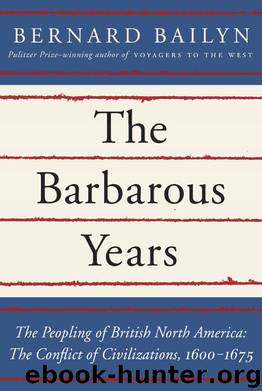The Barbarous Years: The Peopling of British North America: The Conflict of Civilizations, 1600-1675 by Bernard Bailyn

Author:Bernard Bailyn
Language: eng
Format: mobi, epub, azw3
Tags: History
ISBN: 9780307960825
Publisher: Alfred A. Knopf
Published: 2012-11-06T00:00:00+00:00
* * *
* Amsterdam’s bay is shaped like a Y. On the Pythagorean Y emblematic of the choice between evil and virtuous ways, well known to European intellectuals of Plockhoy’s generation, see Frances A. Yates, The Rosicrucian Enlightenment (London, 1972), 56.
CHAPTER 11
God’s Conventicle, Bradford’s Lamentation
1
THERE ARE STRIKING SIMILARITIES between Plockhoy’s settlement at Whorekill on the Delaware and the Pilgrims’ village at Plymouth on the south shore of Massachusetts. Both had Anglo-Dutch origins; both were deliberate and complete removals from a corrupt metropolitan world; both were designed as communes of equal sharing in the initial years; both were convinced that they were the preservers, the protectors and promoters, of pristine Christianity; and in the end both were overtaken by forces they could not control, their people melding into a diverse population whose distinctive folkways had not yet formed.
There were differences too. Plockhoy, born the year of the Pilgrims’ settlement in America, was critical but tolerant of diversity within the Protestant confessions; the Pilgrim leaders feared toleration, which they correctly saw would destroy their entire project, both church and sanctified society.1 Plockhoy saw benefits in business enterprise; the Pilgrims feared its corrosive effect. Plockhoy’s program was elaborately articulated, the product of an intricate system of radical ideas expressed in enumerated rules and precepts; the Pilgrims lived in loose agreement on what they took to be the true and simple principles of primitive Christianity and apostolic purity. Plockhoy’s utopia ended in a sudden, fiery death that was barely recorded and entirely unlamented; the Pilgrims’ utopia faded gradually, its demise documented in lamentations that would become classic texts in elegiac prose. But however different, both were products of the great churnings and burnings in radical Protestantism that account for population displacements throughout the Atlantic world.
Download
The Barbarous Years: The Peopling of British North America: The Conflict of Civilizations, 1600-1675 by Bernard Bailyn.epub
The Barbarous Years: The Peopling of British North America: The Conflict of Civilizations, 1600-1675 by Bernard Bailyn.azw3
This site does not store any files on its server. We only index and link to content provided by other sites. Please contact the content providers to delete copyright contents if any and email us, we'll remove relevant links or contents immediately.
Cecilia; Or, Memoirs of an Heiress — Volume 1 by Fanny Burney(31341)
Cecilia; Or, Memoirs of an Heiress — Volume 3 by Fanny Burney(30938)
Cecilia; Or, Memoirs of an Heiress — Volume 2 by Fanny Burney(30897)
The Great Music City by Andrea Baker(21472)
We're Going to Need More Wine by Gabrielle Union(18081)
Bombshells: Glamour Girls of a Lifetime by Sullivan Steve(13117)
Pimp by Iceberg Slim(12940)
All the Missing Girls by Megan Miranda(12761)
Fifty Shades Freed by E L James(12453)
Talking to Strangers by Malcolm Gladwell(11901)
Norse Mythology by Gaiman Neil(11893)
Crazy Rich Asians by Kevin Kwan(8358)
Mindhunter: Inside the FBI's Elite Serial Crime Unit by John E. Douglas & Mark Olshaker(7844)
The Lost Art of Listening by Michael P. Nichols(6481)
Enlightenment Now: The Case for Reason, Science, Humanism, and Progress by Steven Pinker(6411)
Bad Blood by John Carreyrou(5778)
The Four Agreements by Don Miguel Ruiz(5520)
Weapons of Math Destruction by Cathy O'Neil(5045)
We Need to Talk by Celeste Headlee(4879)
